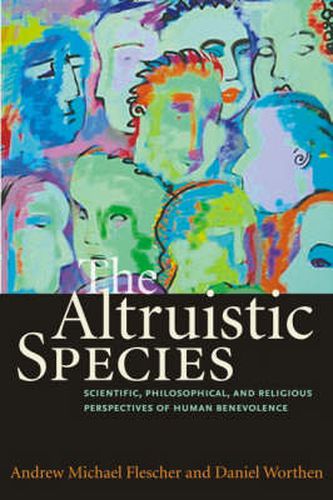Readings Newsletter
Become a Readings Member to make your shopping experience even easier.
Sign in or sign up for free!
You’re not far away from qualifying for FREE standard shipping within Australia
You’ve qualified for FREE standard shipping within Australia
The cart is loading…






What motivates altruism? How essential is the phenomenon of altruism to the human experience? Is altruism readily accessible to the ordinary person? In The Altruistic Species , Andrew Michael Flescher and Daniel L Worthen explore these questions through the lenses of four disciplinary perspectives - biology, psychology, philosophy, and religion. In the course of their investigation, they make an extended argument for the existence of altruism against competing theories that construe all ostensible cases of benevolence as self-interest in disguise. The authors consider theories of egoism; the role of genetics and evolutionary biology; the psychological states that induce altruistic behavior; philosophical theories of altruism in normative ethics such as Kantian, utilitarian, and Aristotelian models of moral action; and accounts of love of the neighbor in Christianity and Buddhism.Additionally, they offer a new, comprehensive definition of altruism that is inclusive of the insights of each of these perspectives.
The Altruistic Species reinvigorates the debate over the prevalence of selfless motivation in human behavior - whether it is a rare or ubiquitous phenomenon, something that is always to be considered exceptional or a capacity that members of any community potentially could develop. This noteworthy interdisciplinary examination of altruism balances science, virtue theory, and theology. It is ideal for courses in ethics, human behavior, and evolutionary biology, as an educational resource for other multidisciplinary studies, and for interested lay readers.
$9.00 standard shipping within Australia
FREE standard shipping within Australia for orders over $100.00
Express & International shipping calculated at checkout
What motivates altruism? How essential is the phenomenon of altruism to the human experience? Is altruism readily accessible to the ordinary person? In The Altruistic Species , Andrew Michael Flescher and Daniel L Worthen explore these questions through the lenses of four disciplinary perspectives - biology, psychology, philosophy, and religion. In the course of their investigation, they make an extended argument for the existence of altruism against competing theories that construe all ostensible cases of benevolence as self-interest in disguise. The authors consider theories of egoism; the role of genetics and evolutionary biology; the psychological states that induce altruistic behavior; philosophical theories of altruism in normative ethics such as Kantian, utilitarian, and Aristotelian models of moral action; and accounts of love of the neighbor in Christianity and Buddhism.Additionally, they offer a new, comprehensive definition of altruism that is inclusive of the insights of each of these perspectives.
The Altruistic Species reinvigorates the debate over the prevalence of selfless motivation in human behavior - whether it is a rare or ubiquitous phenomenon, something that is always to be considered exceptional or a capacity that members of any community potentially could develop. This noteworthy interdisciplinary examination of altruism balances science, virtue theory, and theology. It is ideal for courses in ethics, human behavior, and evolutionary biology, as an educational resource for other multidisciplinary studies, and for interested lay readers.